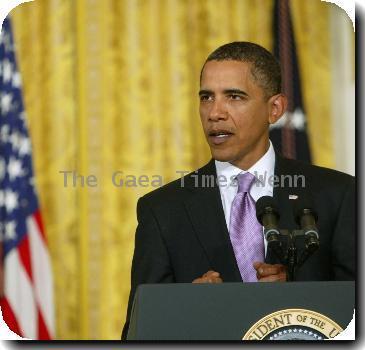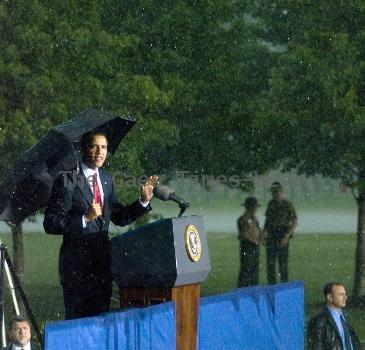Senate race in Pennsylvania turns rough as candidates, outside groups go on air
By Philip Elliott, APFriday, September 17, 2010
Pa. Senate race gets rough, fought through ads
MILL HALL, Pa. — For many in this stretch of rolling forests, small towns and dairy farms, images of the two U.S. Senate candidates are shaped by the steady stream of television commercials that cast Democrat Joe Sestak and Republican Pat Toomey as extremists who are wrecking the economy.
Voters know almost nothing else about the candidates, both of whom live a four-hour drive away and seldom pass through the expansive north-central Pennsylvania corridor.
“You can’t miss it with all the ads on TV,” said Lynn Maryott, a registered Republican who recently retired from a joist manufacturer.
As he sat down to a bowl of oatmeal at a roadside restaurant in Mill Hall, Maryott said what many voters in the nation’s sixth most-populated state are thinking.
“It makes you wonder where all that money comes from,” he grumbled.
National party committees and interest groups have already made Pennsylvania a priority. Its Senate race may predict how the state will swing in the 2012 presidential election, which is why President Barack Obama, who backed Sestak’s primary opponent, is heading to Philadelphia on Monday to raise money for Sestak.
If Obama’s fellow Democrats are to keep their majority in the Senate, this is a seat they must win. But it might not be cheap: Republican Rick Santorum and Democrat Bob Casey alone spent $46 million in Pennsylvania’s fierce race for Senate in 2006, which Casey won.
Based on federal election filings and campaign estimates, Sestak and Toomey thus far haven’t spent close to half that amount.
Money is again flowing into the state — estimates from the campaigns suggest that outside groups, including the U.S. Chamber of Commerce, the Club for Growth and the Democratic Senatorial Campaign Committee, have already spent $6 million to $7 million on TV ads since July.
The airwaves carry the message that Toomey is to blame for the economic meltdown, that Sestak is recklessly raising taxes and the national debt. With the balance of power in Washington at stake — and airtime inexpensive here in rural Pennsylvania — there’s little wonder the ads have become so aggressive and plentiful.
“Pat Toomey, Mr. Wall Street,” an announcer says in an ad from the Democratic Senatorial Campaign Committee that connects the Republican’s time working for investment banks and supporting deregulation in Congress to the financial crisis. “Not for us.”
The counter?
“Washington is failing,” an announcer says in one of Toomey’s ads. “Bailouts, takeovers, a stimulus that gave us record debt without creating jobs. Congressman Joe Sestak voted for all of it.”
To buttress their fundraising prospects, both candidates have been busy trying to repair — or, in some cases, create — relationships with political powers that could target their opponents.
In a sign that his campaign is attempting to move past the bruising split during the primary, Sestak has made the rounds with leaders of powerful constituencies. He met for 75 minutes with AFL-CIO President Richard Trumka, whose union backed longtime incumbent Sen. Arlen Specter, who served most of his five terms as a Republican before switching to the Democratic Party last year in a failed attempt to save his political career.
Sestak met with about 30 Jewish leaders, who also had backed Specter. He met with black clergy at Philadelphia’s Bright Hope Baptist Church for a unity breakfast to rally the powerful political leaders. And he met with Democratic state lawmakers in July to urge them to come together behind his candidacy.
Just don’t expect Sestak to kowtow to the party.
“I am running as an independent-minded person,” Sestak said in an interview with The Associated Press. “If the party’s wrong, I’ll vote on the side of the working family. … Party is secondary.”
And that antiestablishment streak is why some supporters worry that the party may decide to send its money — for ads, for polling, for phone calls — elsewhere to defend incumbent Democrats who are in trouble and whose victories would be cheaper to secure.
The same could be said for Republicans and Toomey.
As president of the free-market advocate Club for Growth, Toomey relentlessly attacked staunch Republicans who didn’t toe a strict anti-tax, anti-regulation line. The group, which has endorsed a number of tea party-backed candidates, hurt the presidential aspirations of Arkansas Gov. Mike Huckabee, tried to end Rhode Island Sen. Lincoln Chafee’s political career and called Maine’s moderate Republican senators, Olympia Snowe and Susan Collins, its “Comrade of the Month.”
If there’s any hard feelings, Collins put them aside to appear at a Toomey fundraiser in Philadelphia over the summer. Meanwhile, Toomey has played up last week’s endorsement by moderate former Pennsylvania Gov. Tom Ridge while avoiding any appearance of an alliance with tea party groups.
Sestak and Toomey are now wielding the hard-edged rhetoric and attacks mirroring those in use by the party establishments in races nationwide — a far cry from how the candidates initially treated each other.
Sestak and Toomey held a couple of collegial debates and even went to a bar to knock back a beer after one. At the time, Specter was their common enemy, the man each wanted to replace. Even after Sestak stunned Pennsylvania and beat the party-endorsed Specter in a come-from-behind victory in May’s Democratic primary, Toomey promptly congratulated Sestak in a video message on his website.
Toomey then ran a TV ad that announced the candidates as “two good men with very different ideas.” That tone is gone.
Elliott reported from Philadelphia.
Tags: Barack Obama, Campaigns, Mill Hall, North America, Pennsylvania, Philadelphia, Political Endorsements, Political Fundraising, Senate Elections, United States

